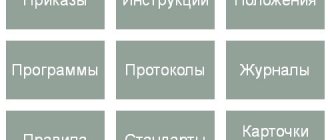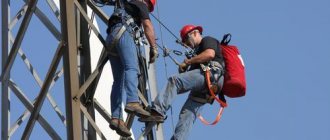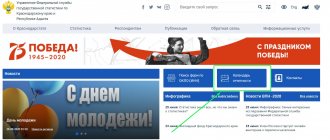Public administration: what does it involve?
Public administration involves appropriate activities on the part of bodies that are authorized to perform special functions of permission, control and supervision aimed at implementing national policy. Also, authorized authorities can implement legal provisions guaranteeing the safety of employees, prevent possible violations and eliminate detected shortcomings.
Labor safety instructions - a regulatory document for all enterprises of the Russian Federation
What is the essence of the system
Goals of implementation of state policy in the field of labor protection:
- creation of proper working conditions that do not pose a threat to health and life at enterprises of various forms;
- protection of the rights and interests of workers;
- prevention of unforeseen situations, accidents, industrial injuries.
Also, centralized regulation guarantees effective interaction and fruitful cooperation between objects of social and labor relations.
Who carries out
Occupational safety management at the enterprise and in the organization
Who carries out state management of labor protection in accordance with the Labor Code? Article 216 determines that all powers are exercised by the Government and authorized bodies on its behalf. At the same time, federal authorities must coordinate all actions with higher authorities.
Important! Some official powers on public administration issues can be transferred to local authorities (entities) on the conditions prescribed by law.
Public administration is carried out within the current official powers by government structures at the federal level and at the local level. A description of the functions of both divisions will be given below.
Federal government
State management of labor protection is carried out, as mentioned above, primarily at the federal level. These structures are responsible for:
- development of regulations that set out the fundamentals of the industry;
- development of targeted federal programs aimed at improving working conditions and health protection of employees at work;
- determining the order of training and instruction;
- establishing a scheme for conducting state examination of current working conditions;
- development of measures aimed at economic stimulation of activities to ensure safe working conditions;
- organizing interaction between federal and regional executive authorities with trade unions and employers' associations to implement development and control programs through joint efforts;
- coordinating specialized research activities, introducing advanced international experience;
- organizing systems of international cooperation on labor protection legislation.
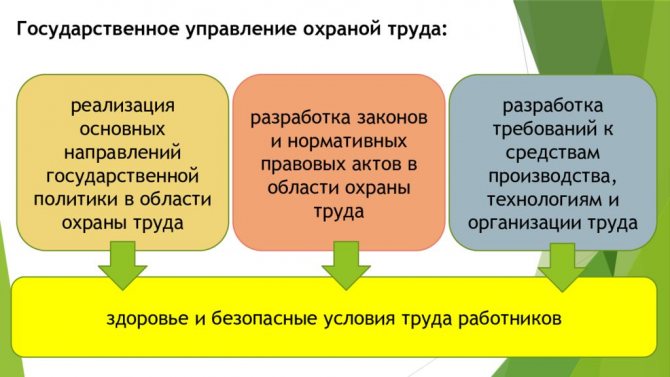
Problems solved by state labor protection management: diagram
Federal government structures may also perform other functions in the field of state management of labor protection in accordance with the provisions of the Federal Law and other regulations of the Russian Federation.
Regional level of control
Executive subjects of local authorities of the Russian Federation are responsible for:
- implementation of state policy provisions and targeted programs aimed at improving labor safety conditions;
- development, approval of target programs at the territorial level, control;
- coordination of the training process for local workers, including employers and management of organizations;
- carrying out state examination of working conditions;
- collection, processing of information data on the state of conditions, quality of security in organizations under the jurisdiction of the subject.
Certain powers can be directed to local government.
The main goals of the state examination of working conditions
The list of main goals of the state examination of working conditions includes:
• identifying the actual state of working conditions; • finding out whether benefits and compensation payments are correctly assigned to employees who work in unfavorable health conditions; • assessment of the quality of a previously conducted special assessment of working conditions.
If during the state examination the state inspector identifies violations, he issues an order to employers requiring them to eliminate these inconsistencies with the norms of the legislation of the Russian Federation. If the violations are serious, the inspector draws up a demand to liquidate the entire enterprise or close individual structural units and sends it to court.
The implementation of the main goals of the state examination of working conditions makes it possible to achieve full compliance with the requirements of the labor protection legislation of the Russian Federation. Its organizers and performers have the following rights:
• receive any materials they need for high-quality expert work; • inspect workplaces, equipment, and the territory of any enterprises; • entrust the conduct of special studies or measurements to accredited laboratories and organizations; • observe, measure, make calculations, draw up graphs, tables.
These persons are obliged:
• complete the work on time; • guarantee confidentiality; • draw reasonable and objective conclusions; • draw up a conclusion; • send it to the applicant and interested parties; • ensure the safety of materials that were submitted for examination; • present your ID.
When is expertise needed?
State examination of production conditions is carried out by an authorized subject of executive power or a federal body in the manner prescribed by law.
How are measures to improve working conditions and safety financed?
Expertise is needed for:
- certification of workplaces in accordance with established rules;
- providing employees with monetary compensation for performing hazardous work and activities in hazardous industries;
- assessing the degree of compliance of projects for reconstruction, construction, technical re-equipment of production facilities with current standards;
- analysis of working conditions, including in the period preceding the accident.
Grounds for state examination - appeals from authorities, employers, employees, trade unions, insurance funds, court rulings.
Important! The presence of legal grounds for an inspection is mandatory - an examination cannot be carried out just like that, in words.
Article 218. Committees (commissions) on labor protection
At the initiative of the employer and (or) at the initiative of employees or their representative body, labor protection committees (commissions) are created. Their composition on a parity basis includes representatives of the employer and representatives of the elected body of the primary trade union organization or other representative body of workers. The standard regulations on the labor protection committee (commission) are approved by the federal executive body that carries out the functions of developing state policy and legal regulation in the field of labor.
(Part one as amended by Federal Law No. 90-FZ dated June 30, 2006)
The labor protection committee (commission) organizes joint actions of the employer and employees to ensure labor protection requirements, prevent industrial injuries and occupational diseases, and also organizes inspections of labor conditions and labor protection in the workplace and informs employees about the results of these inspections, collects proposals for the section collective agreement (agreement) on labor protection.
What objects are checked
OSHMS: occupational safety and health management system
State examination is carried out for any production facilities if it is necessary to assess real working conditions. It is also necessary for high-risk industrial production and other enterprises where people work.
Taking into account the purposes of the audit, the possible actions of authorized bodies and officials who represent them differ.
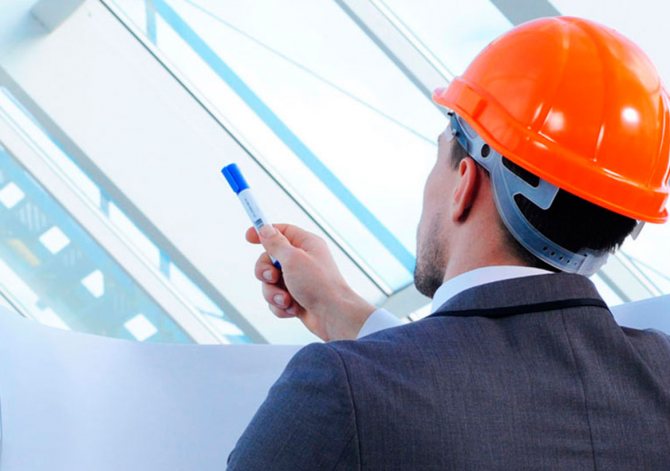
The responsible engineer conducts an examination of the facility
Types of violations
Types of liability for violations of labor protection requirements are established in Article 419 of the Labor Code of the Russian Federation. All types of liability are discussed below.
Consequences of violations of labor protection rules
There are several types of liability for violation of labor safety rules:
- Disciplinary – it is assigned to an employee who does not comply with current labor protection requirements. Types of liability - dismissal, reprimand, reprimand.
- Material liability - such liability is provided for by the terms of a specific contract; if there is no corresponding clause, the employee cannot be involved. Financial liability is assigned if the employee’s actions are illegal, there are pronounced actions or inactions that led to undesirable consequences.
- Administrative - also imposed for ignoring labor safety rules. Managers, individual entrepreneurs (if there are employees), and heads of enterprises are involved. The presence of intentional guilt is mandatory.
- Criminal - only individuals are involved, regardless of their position.
Important! The employee bears financial responsibility in the amount of monthly earnings. An exception is cases of payment to third parties who have suffered as a result of illegal actions, compensation from the employer.
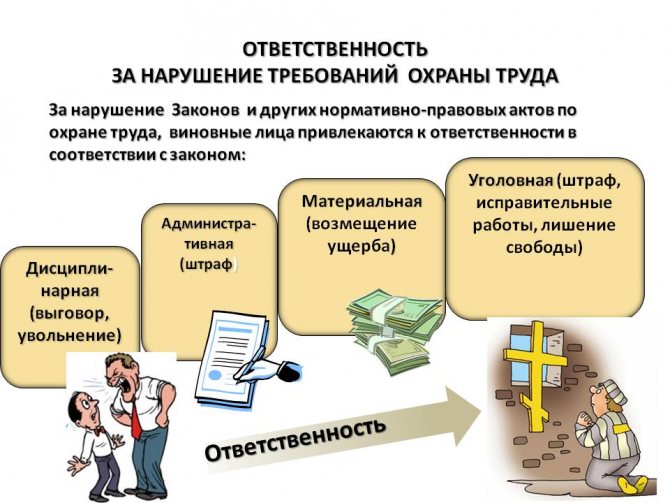
Schematic representation of types of liability for violations
OSMS in Russia: state supervision and control
Due to the numerous requirements of labor legislation, monitoring their implementation is required. So, OSMS in Russia , according to Art. 353-354 of the Labor Code of the Russian Federation, implies monitoring the employer’s compliance with regulatory requirements for labor protection through:
- the Prosecutor General of the Russian Federation and subordinate prosecutors;
- The Federal Labor Inspectorate, consisting of a federal executive body authorized to conduct state supervision and control over compliance with labor legislation.
Laws
The procedure for regulating the work in the field of labor protection is determined by Article 216 of the Labor Code of the Russian Federation. If there are disagreements on the issues of conducting or assessing the results of the examination, authorized specialists turn to the requirements of the Federal Law “On the provision of state and municipal services.” All statements regarding disagreements are reviewed free of charge.
Federal authorities and regional structures are involved in resolving issues related to labor protection in Russian industrial production. When certifying workers, as part of the investigation of industrial accidents, an examination is needed. For violation of labor protection requirements, material, disciplinary, administrative, and criminal liability is provided.
Article 217. Labor protection service in an organization
In order to ensure compliance with labor protection requirements and monitor their implementation, each employer engaged in production activities, whose number of employees exceeds 50 people, creates a labor protection service or introduces the position of a labor protection specialist with appropriate training or experience in this field.
(as amended by Federal Law No. 90-FZ of June 30, 2006)
An employer whose number of employees does not exceed 50 people decides to create an occupational safety service or introduce the position of an occupational safety specialist, taking into account the specifics of its production activities.
(Part two as amended by Federal Law No. 90-FZ of June 30, 2006)
If the employer does not have an occupational safety service or a full-time occupational safety specialist, their functions are performed by the employer - an individual entrepreneur (personally), the head of an organization, another employee authorized by the employer, or an organization or specialist providing services in the field of occupational safety and health, engaged by the employer under a civil contract . Organizations providing services in the field of labor protection are subject to mandatory accreditation. The list of services for which accreditation is required, accreditation rules, including accreditation requirements that organizations providing services in the field of labor protection must meet, the procedure for monitoring the activities of accredited organizations, the procedure for suspending or revoking accreditation are established by the federal executive body carrying out functions for the development of state policy and legal regulation in the field of labor.
(as amended by Federal Laws dated June 30, 2006 N 90-FZ, dated July 18, 2011 N 238-FZ)
The structure of the labor protection service in the organization and the number of employees of the labor protection service are determined by the employer, taking into account the recommendations of the federal executive body that carries out the functions of legal regulation in the field of labor.
(as amended by Federal Law dated August 22, 2004 N 122-FZ)




